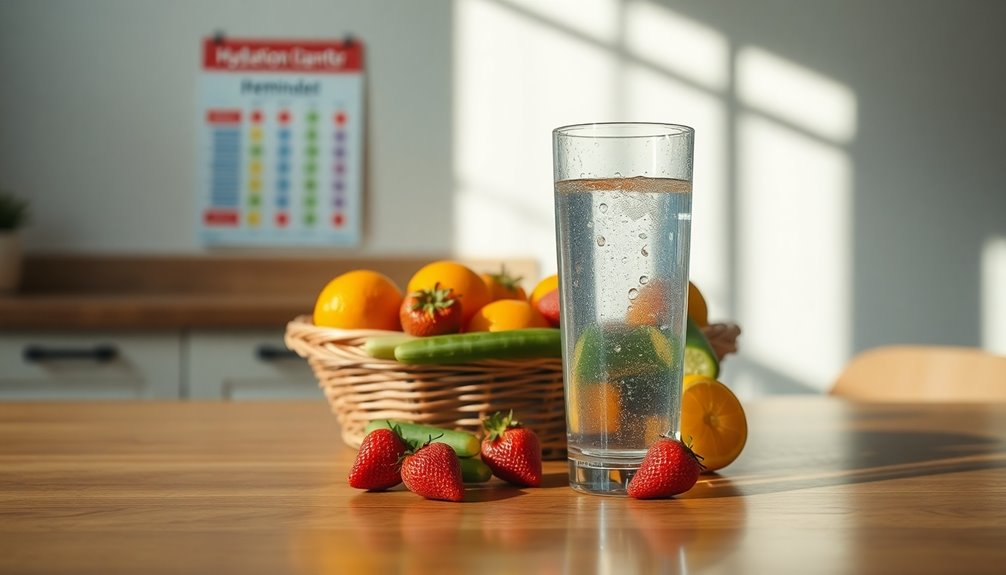Dehydration can sneak up on you, showing signs like thirst, dark urine, dry skin, and fatigue. Even mild dehydration can hinder your physical performance and mental clarity. You might also feel mood changes, such as anxiety or frustration when you're not properly hydrated. Keeping track of your fluid intake is essential, especially in hot weather or during intense exercise. By recognizing these early signs, you can prevent dehydration from worsening and protect your overall health. There are effective strategies to stay hydrated, ensuring you feel your best and function at your highest level as you explore further insights.
Key Takeaways
- Signs of dehydration include thirst, dark urine, dry skin, fatigue, and dizziness, indicating the body's need for fluids.
- Dehydration negatively impacts mental function, mood, and cognitive abilities, leading to frustration and anxiety.
- Proper hydration enhances physical performance, endurance, and strength during exercise and daily activities.
- Staying hydrated supports the immune system, aids in nutrient transport, and flushes out toxins from the body.
- At-risk populations, such as the elderly and children, require special attention to prevent dehydration due to unique health challenges.
Understanding Dehydration
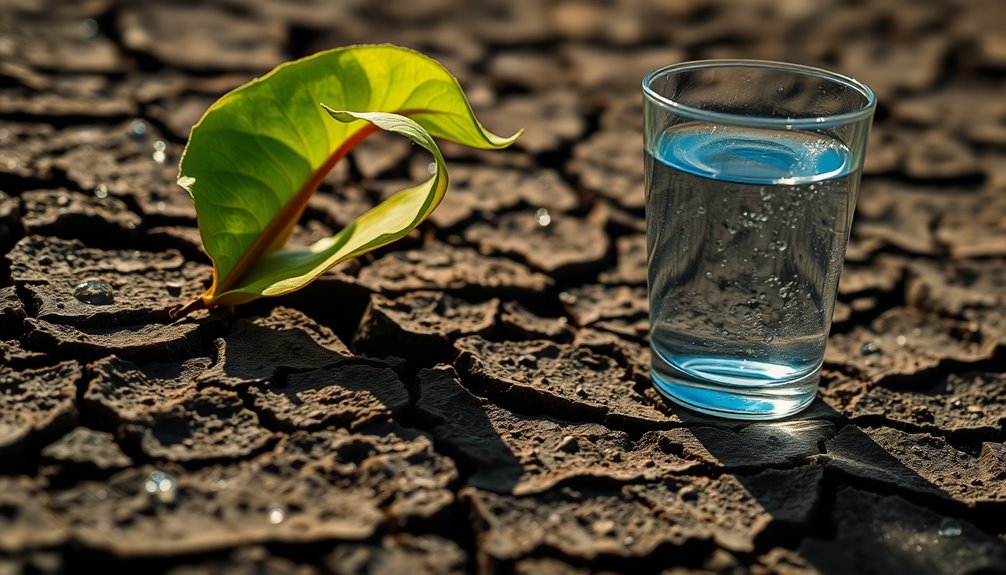
When you think about dehydration, it's easy to overlook how quickly it can sneak up on you, especially during hot weather or intense exercise. Your body relies on water to function effectively, and even mild dehydration can impact your performance and overall well-being. Understanding the importance of hydration helps you take proactive steps toward dehydration prevention.
One of the best hydration techniques involves incorporating water into your daily routine. Aim to drink water consistently throughout the day, not just when you're thirsty. You might consider carrying a reusable water bottle as a reminder to sip regularly.
Adding hydrating foods to your diet can also support your hydration goals. Fruits like watermelon, oranges, and cucumbers contain high water content and can be delicious snacks while keeping you hydrated.
If you're engaging in physical activity, especially in the heat, take extra precautions. Make it a habit to drink water before, during, and after your workouts. Sports drinks can be beneficial during intense exercise, as they replenish electrolytes lost through sweat, but water should remain your primary source of hydration. Additionally, staying hydrated can enhance your workout performance, making it easier to engage in mini band workouts that effectively tone and sculpt your body.
Common Signs of Dehydration

Recognizing the signs of dehydration is important for maintaining your health and well-being. Dehydration can sneak up on you, but knowing what to look for can help you stay hydrated and energized. Here are some common signs to watch out for:
| Signs | Description |
|---|---|
| Thirst | A signal that your body needs water. |
| Dark Urine | Indicates concentrated waste; should be light yellow. |
| Dry Skin | Skin may lose its elasticity and feel rough. |
| Fatigue | Low energy levels can be a sign of dehydration. |
To minimize dehydration risks, you can implement some effective prevention strategies. Keeping a water bottle handy throughout the day can serve as a reminder to drink more fluids. Hydration monitoring is also important; consider tracking your water intake with an app or journal. This way, you can ensure you're meeting your daily hydration goals.
You'll also want to pay attention to your body's signals. If you find yourself feeling unusually tired or experience a headache, these might be early indicators that you need to up your fluid intake. By staying aware of these signs and adopting proactive hydration practices, you can promote your overall health and maintain your vitality. Remember, your body needs water to function at its best, so make it a priority! Additionally, being mindful of your nutrition, such as incorporating Half Day Keto principles, can support your hydration and energy levels effectively.
Physical Symptoms to Watch For
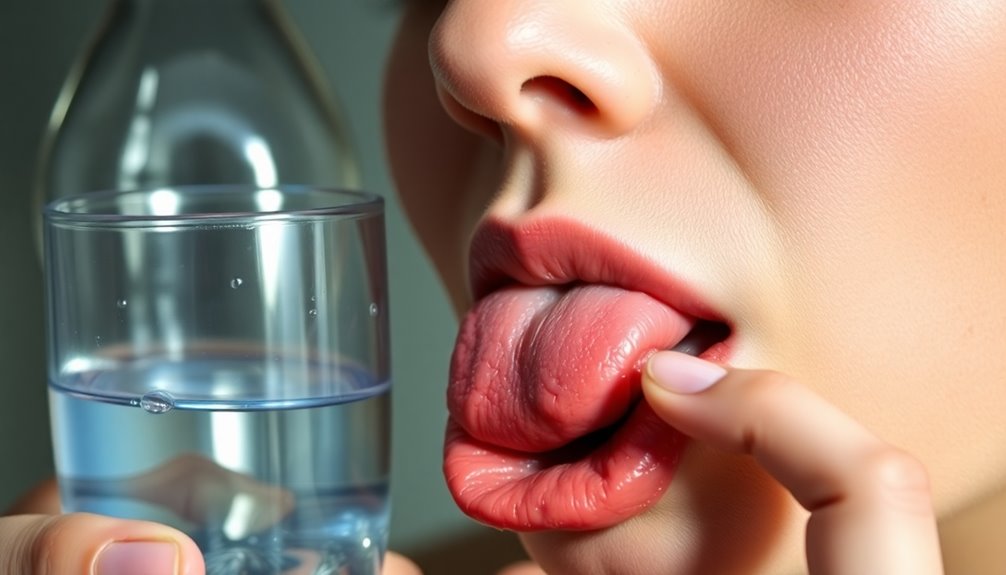
Being attentive to dehydration signs is just the start; understanding the physical symptoms that accompany this condition is equally important. When you're dehydrated, your body sends clear signals. The first symptom you might notice is thirst. If you find yourself reaching for a glass of water more often, it's a warning sign.
Dry mouth and dry skin are also common indicators. You may notice your skin lacks elasticity or feels rough to the touch. Another physical symptom to watch for is fatigue. If you're feeling unusually tired, it could be your body's way of saying it needs more fluids.
Headaches can be another telltale sign of dehydration. Lack of water can lead to reduced blood flow and oxygen to your brain, resulting in discomfort. Dark yellow urine is another key symptom; ideally, your urine should be light and clear. If you're seeing a deeper hue, that's a definite signal to hydrate.
Preventing dehydration involves being proactive about your fluid intake, especially during hot weather or vigorous exercise. Keep a water bottle handy and sip throughout the day. Recognizing dehydration symptoms early can help you avoid more serious health complications down the line. Additionally, maintaining proper hydration supports your liver's ability to perform over 500 crucial functions that are essential for overall health.
Mental Effects of Dehydration
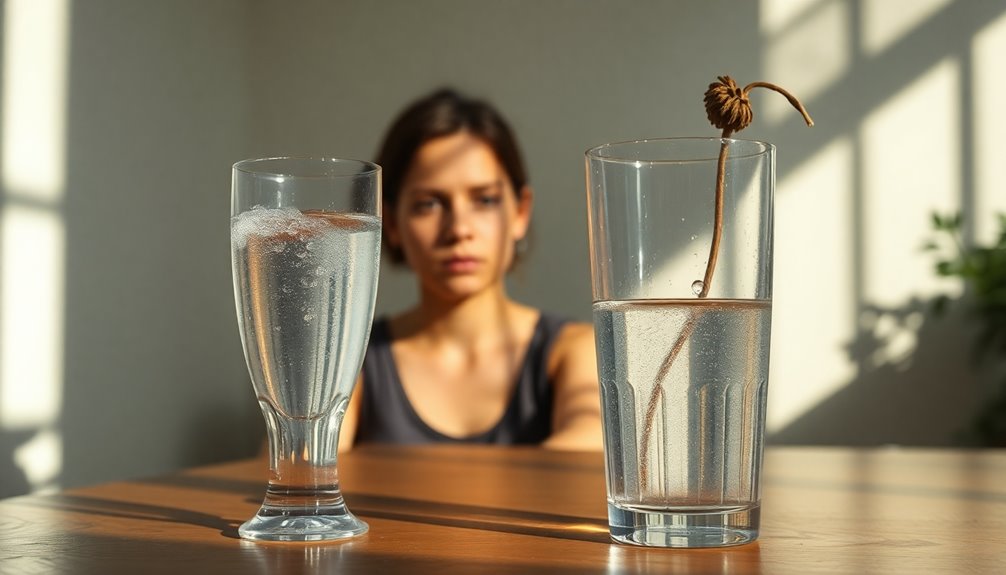
Many people don't realize that dehydration can greatly impact mental function and mood. When you're not drinking enough water, your brain doesn't get the hydration it needs to operate at its best. This can lead to noticeable cognitive impairment, making it harder to concentrate, remember things, or think clearly. You might find that your mood takes a hit too, leading to feelings of irritability or fatigue.
Here are some emotional effects you might experience when dehydrated:
- Frustration from not being able to focus on tasks
- Anxiety or restlessness that seems to come out of nowhere
- Sadness that drags you down, affecting your interactions with others
- A sense of overwhelm when facing daily challenges
- A feeling of isolation as you withdraw from social situations
Research shows that even mild dehydration can lead to mood changes, impacting your overall well-being. It's easy to dismiss these feelings as just part of a busy day, but the truth is that hydration plays a critical role in maintaining your mental health. Additionally, healthy nerves can also be affected by dehydration, as a well-hydrated body supports overall wellness.
When you're well-hydrated, you're better equipped to handle stress, engage with others, and enjoy life fully.
Importance of Early Recognition
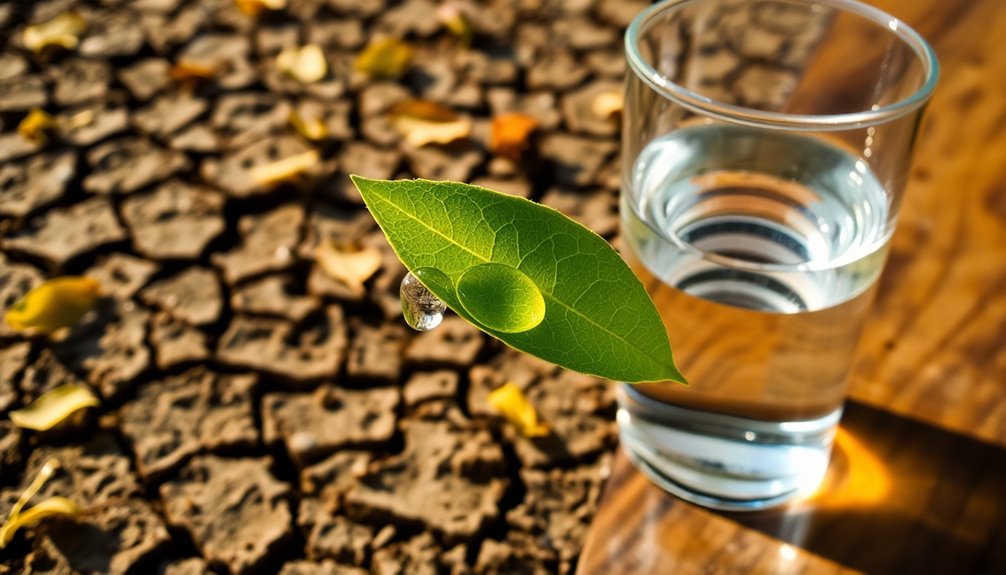
Understanding how dehydration affects your mental state highlights the significance of early recognition of its signs. When you notice symptoms like dry mouth, fatigue, or dizziness, it's essential to act quickly. By recognizing these indicators promptly, you can prevent dehydration from escalating into a more serious condition. This proactive approach not only safeguards your physical health but also supports your mental well-being, which can be adversely affected by inadequate hydration.
One of the most effective hydration strategies is to stay aware of your fluid intake throughout the day. Set reminders to drink water, especially during busy times, or incorporate hydrating foods like fruits and vegetables into your meals. Keeping a water bottle handy can also make it easier to sip regularly. By making these small adjustments, you can help prevent dehydration before it starts affecting your performance or mood.
Moreover, early recognition isn't just about self-care; it fosters a sense of community and belonging. By sharing your hydration strategies with friends and family, you encourage them to pay attention to their own hydration needs. When you work together to stay hydrated, you create an environment where everyone feels supported and valued. Additionally, maintaining proper hydration can also improve your body's ability to prevent injuries and support overall wellness.
Hydration's Role in Overall Health
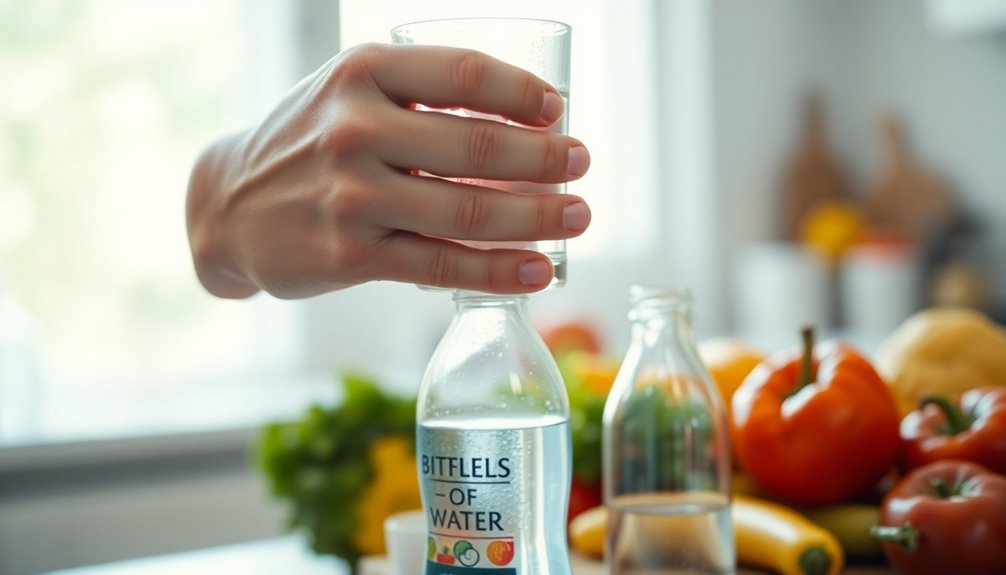
Hydration plays a pivotal role in maintaining overall health, influencing everything from your physical performance to cognitive function. Staying adequately hydrated can notably affect how you feel and function daily. When you prioritize hydration, you're not just quenching your thirst; you're also supporting your body in multiple ways.
Consider these emotional aspects of proper hydration:
- Feeling energized and ready to tackle your day
- Enjoying clearer skin and a radiant complexion
- Experiencing improved focus and mental clarity
- Supporting your immune system to fend off illnesses
- Enhancing your mood and overall well-being
Good hydration is essential for maintaining strong immunity. When you're well-hydrated, your body can effectively flush out toxins and transport nutrients, which keeps your immune system robust. This assists in dehydration prevention, ensuring that you're less likely to experience fatigue, headaches, or dizziness.
Moreover, hydration impacts your physical performance. Whether you're exercising or simply going about your daily routine, adequate fluid intake enhances endurance, strength, and overall efficiency. You'll find that when you stay hydrated, you can push yourself further, whether at the gym or in everyday tasks.
Incorporating mindful hydration into your routine fosters a sense of belonging to a community that values health. You're not alone in this journey; everyone benefits from proper hydration, leading to a more vibrant life. Interestingly, just as staying hydrated supports your physical health, it can also lead to feelings of calmness and balance similar to the benefits experienced with Brainwave Guidance technology found in programs like InnaPeace. So, make it a point to drink enough water daily, and embrace the positive effects on your health and well-being.
At-Risk Populations
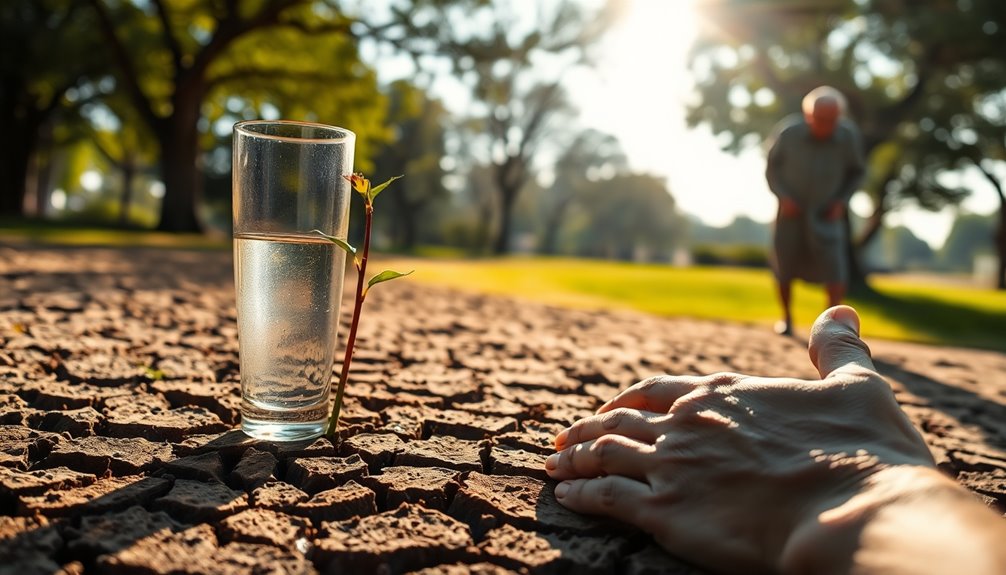
Certain groups of people are particularly vulnerable to dehydration, making it important to recognize their unique needs. The elderly, for instance, face specific dehydration risks due to factors like reduced thirst sensation, changes in kidney function, and certain medications that may contribute to fluid loss. As you age, staying hydrated becomes even more vital, as dehydration can lead to severe complications, including confusion and urinary tract infections. Additionally, individuals with high blood pressure may experience exacerbated symptoms when dehydrated, highlighting the importance of maintaining adequate fluid intake.
On the other hand, children have distinct hydration needs that are often overlooked. Pediatric hydration is essential, especially during hot weather or vigorous activities. Kids are more prone to dehydration because their bodies have a higher surface area-to-volume ratio, meaning they lose fluids more quickly than adults. They mightn't always recognize when they're thirsty, so it's important for caregivers to encourage regular fluid intake.
Paying attention to these at-risk populations fosters a sense of community and belonging, as you're ensuring that vulnerable individuals receive the care they need. By understanding the specific hydration challenges faced by the elderly and children, you can help create an environment where everyone feels supported and informed. Whether you're caring for an aging parent or looking after your children, being proactive about hydration can make all the difference in maintaining their health and well-being. Recognizing these unique hydration needs is the first step to ensuring that everyone stays healthy and hydrated.
Tips for Staying Hydrated
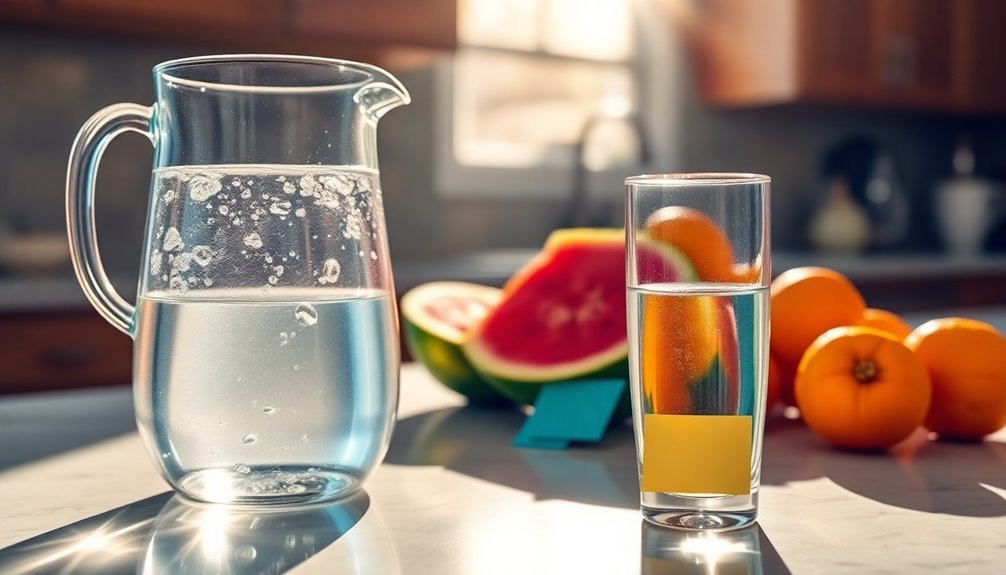
Staying hydrated is crucial for maintaining your overall health and well-being, and there are several effective strategies to help you achieve this goal. By implementing these hydration strategies, you can ensure your body functions at its best, fostering a sense of belonging and energy in your daily life.
First, make a conscious effort to monitor your water intake levels. Aim for at least eight 8-ounce glasses daily, but adjust according to your activity level, climate, and individual needs. Carry a reusable water bottle to remind yourself to sip throughout the day.
Here are some practical tips to keep you on track:
- Set reminders: Use your phone or a hydration app to alert you when it's time to drink.
- Flavor it up: Add slices of fruits or herbs to your water for a invigorating twist that'll make hydration enjoyable.
- Eat your water: Incorporate water-rich foods like cucumbers, watermelon, and oranges into your meals and snacks.
- Hydrate before meals: Drinking a glass of water before each meal can help you stay mindful of your intake and support digestion.
- Make it a habit: Pair drinking water with daily activities, like having a glass right after brushing your teeth.
When to Seek Medical Attention
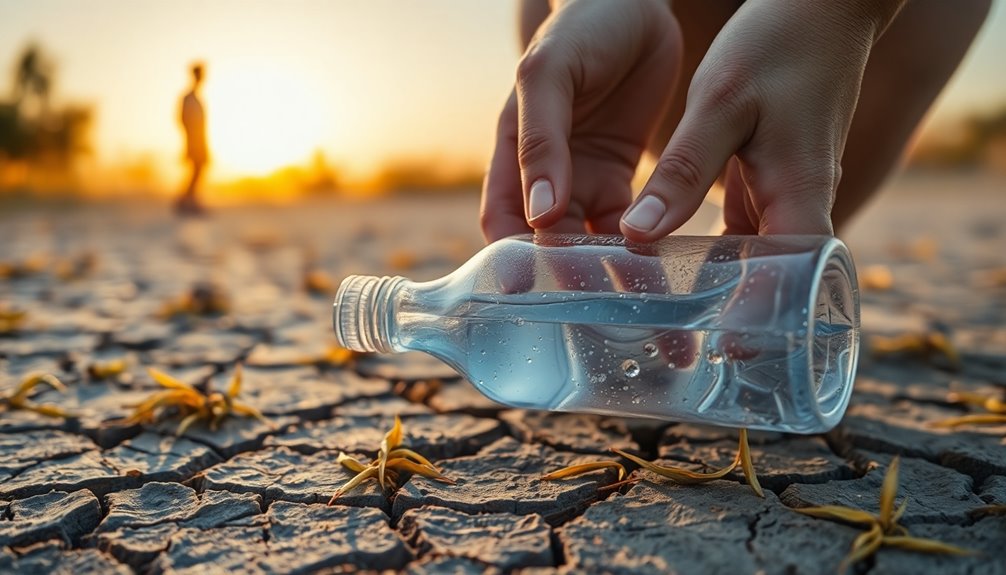
Recognizing the signs of dehydration is vital for your health, as ignoring them can lead to serious complications. If you notice symptoms like extreme thirst, dry mouth, or dark urine, it's essential to pay attention.
However, there are moments when you need to take action and seek medical attention. You should consider getting help if you experience severe dehydration symptoms. This includes persistent vomiting, diarrhea, or inability to keep fluids down.
If you're feeling dizzy, confused, or lethargic, these can be red flags indicating that your body is struggling and may require immediate medical intervention. Severe dehydration can lead to complications like kidney damage or electrolyte imbalances, which can be life-threatening if not addressed promptly.
Additionally, if you're caring for someone vulnerable, such as an elderly person or a young child, keep a close eye on their hydration status. Signs like dry skin, no tears when crying, or unusually low energy levels can signal that they need professional help.
Frequently Asked Questions
How Does Dehydration Affect Athletic Performance?
Dehydration can seriously impact your athletic performance. When you're not adequately hydrated, your electrolyte balance gets thrown off, which can lead to muscle cramps and fatigue.
You might find it more challenging to maintain endurance and focus during workouts. Staying hydrated promotes your body functions at its peak, allowing you to perform at your highest level.
Drink water and replenish electrolytes to keep your performance sharp and your body happy. You've got this!
Can Dehydration Cause Long-Term Health Issues?
Think of your body as a garden; without water, it wilts. Yes, dehydration can lead to long-term health issues like kidney stones and urinary tract infections. To prevent this, you need effective dehydration prevention strategies.
Incorporate hydration strategies like drinking water regularly and consuming hydrating foods. Staying well-hydrated isn't just about quenching thirst; it's about nurturing your body for the long haul, ensuring you thrive in every aspect of life.
What Beverages Are Best for Hydration?
When it comes to hydration, not all beverages are created equal. Water's always a top choice, but drinks containing electrolytes can help maintain your electrolyte balance, especially after exercise. Avoid hydration myths like thinking sugary drinks hydrate you effectively; they often do the opposite.
Herbal teas and coconut water are great alternatives too. Staying informed about your choices helps you stay hydrated and connected with others who prioritize health just like you.
How Much Water Should Children Drink Daily?
Think of hydration as a superhero, essential for your child's well-being.
According to hydration guidelines, children typically need about 5 to 7 cups of water daily, depending on their age and activity level. Water intake recommendations suggest more during hot weather or physical activity.
Encourage your child to sip throughout the day, making it a fun habit.
Does Climate Affect Hydration Needs?
Absolutely, climate does affect your hydration needs. Hotter temperatures can lead to quicker fluid loss, increasing your risk of dehydration. As you age, your body's ability to conserve water decreases, making it essential to monitor your intake. Environmental factors like humidity and altitude also play a role in dehydration.
Staying aware of these elements helps you stay properly hydrated, ultimately supporting your overall health and well-being, especially as you navigate the aging process.
Conclusion
In the grand scheme of health, "an ounce of prevention is worth a pound of cure." Staying aware of dehydration signs and maintaining proper hydration can notably impact your well-being. By recognizing symptoms early, you can prevent more serious health issues down the line. Remember, everyone's hydration needs vary, so listen to your body and prioritize water intake. With these practices, you'll not only feel better but also be setting the foundation for long-term health.

